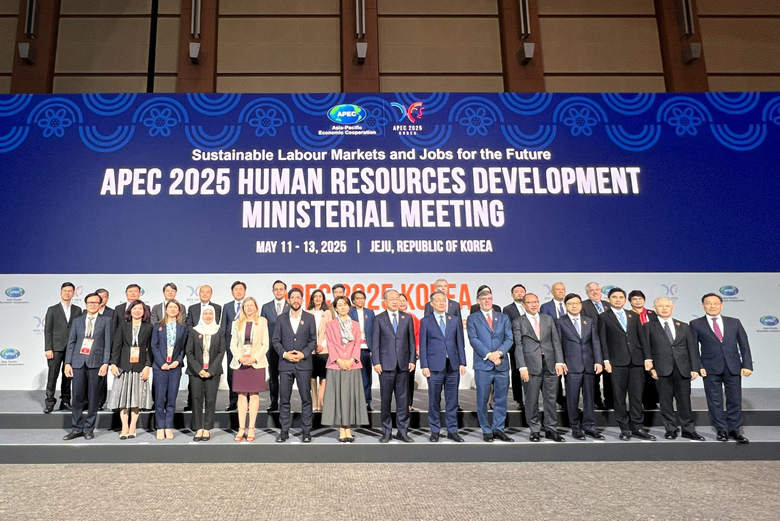
APEC employment and labor ministers kicks off critical discussions in Jeju on Monday, calling for overhauls in employment systems and skills strategies as economies grapple with the dual disruption of technology and aging.
Chaired by Min-suk Kim, Acting Minister of Employment and Labor of the Republic of Korea, the 7th APEC Human Resources Development Ministerial Meeting underscores the urgency of adapting workforce systems to new realities shaped by artificial intelligence, demographic shifts and the growing complexity of employment types.
"Around the world, we are witnessing profound shifts in the way we work. New forms of employment are becoming more common and accordingly policies to protect workers are evolving. In this context, labor market increasingly face job disparities and polarization," Acting Minister Kim said in his opening remarks.
"To turn these challenges into opportunities, our collective action to enhance the adaptability and the resilience of labor market is more important than ever."
Held under the theme "Sustainable Labour Markets and Jobs for the Future," the meeting marked the first gathering of APEC labor ministers in more than a decade with the last ministerial meeting held in Ha Noi, Viet Nam in 2014.
Acting Minister Kim urged member economies to retool institutional frameworks to meet the demands of a modern workforce. He called for flexible wage and work-hour systems, tailored to performance and job roles, highlighting that a more flexible system "will enable us to respond more effectively to changing conditions and support smoother transitions for workers across sectors."
He also urged his counterparts to strengthen and expand more high-quality employment opportunities in labor markets, including investing in education and training so young people can acquire the skills they need to thrive in the future workforce.
"At the same time, we must ensure broader participation in the labor force, particularly among women and older workers," Acting Minister Kim said. "This requires re-skilling and upskilling workers with digital capacities throughout their life cycle, with a focus on digital competencies such as AI."
The Chair emphasized the importance of enhancing institutional and financial support to safeguard the rights of workers in diverse forms of employment, including platform workers, stressing that "no one should fall through the cracks."
"Of course, these are not challenges that any single economy can solve alone. They require deeper cooperation and shared responsibility," Acting Minister Kim added.
"Closer collaboration is required to make sure that all workers can benefit equally from future transformations," he continued. "Despite our different economic and social contexts, all 21 APEC member economies are united by a common goal: building sustainable labor markets and jobs."
Acting Minister Kim proposed the regular convening of a Sustainable Jobs Forum to bring together government and business stakeholders from across the Asia-Pacific to translate policy dialogue into action.
The full-day ministerial program continued with plenary sessions focused on labor flexibility and active workforce strategies, featuring presentations from member economies and international institutions such as the International Labour Organization and the Organisation for Economic Co-operation and Development.






